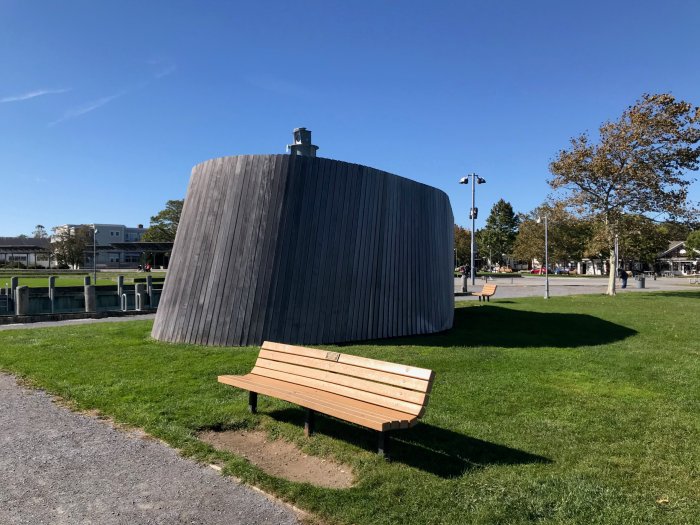
Five candidates for Town of Oyster Bay council board seats recently participated in a Meet The Candidates forum at Plainview-Old Bethpage Library in preparation for the Nov. 7 election, where they discussed issues ranging from taxes, the cost of living and road repairs, to environmental concerns.
Hosted by the League of Women Voters, the council candidates were James Versocki, Eva Pearson, Robert Freier, Michael Castellano and Steven Abreu. Michael Reich and current town council members Louis Imbroto and Michele Johnson were scheduled to participate in the panel as council board candidates and did not attend.
Speaking to whether they would favor adopting the protocols of the Paris Climate Accord, Freier, a small business owner and Democratic, Working Families Party, Independent and Women’s Equality Party candidate, said if elected, Oyster Bay would adopt their own climate accord for all practical purposes, and placed a focus on the ongoing plume water contamination issue in Bethpage.
Abreu, who is running on the Progressive Party Line and cited junior U.S. Senator from Vermont and former presidential candidate Bernie Sanders as one of his primary influences, said he is in favor of adopting the protocols and emphasized the importance of it based on Oyster Bay’s location.
Castellano, a candidate on the Reform Party and physician at Winthrop Hospital, said he would not “blindly” accept the Paris agreement, saying if it will cost every tax payer “for some vague agreement,” than he would not be on board. He stressed the importance of selecting only programs that will help the Oyster Bay directly.
Pearson, a Democratic, Working Families Party, Independent and Women’s Equality Party candidate as well and United States Air Force veteran and professor, said it is important for the town to work with all levels of government, and if the climate accord is implemented, it needs to be done on a county, state and federal level.
Versocki, Democratic, Working Families Party and Women’s Equality Party candidate and former fraud prosecutor, joined Pearson’s sentiments and advocated for partnering with New York State Research and Development Authority (NYSERDA) to help incentivize home owners to have geothermal and solar energy to reduce costs.
Addressing taxes and the affordability factor for living in Oyster Bay, Pearson said there is a “mass exodus” of young people leaving Long Island due to increased living costs and taxes—therefore advocating for transit-oriented development and downtown revitalizations up and down the town. She offered the recent redevelopment of downtown Farmingdale as an example.
Versocki is also in favor of transit-oriented development, saying his children “have flocked to Brooklyn and Queens because they want to be near the train, get to places easily—and we can use that model all throughout Long Island.”
Abreu echoed those sentiments, saying that model will create jobs and a more attractive living environment for young people. Freier also joined in with support and said he would be in favor of technology incubators to foster job growth.
Castellano said building more homes and offering affordable housing is not the key and pointed to job creation as the answer.
“By increasing the number of people without jobs, it will only drive up the need for more schools, which will increase our property taxes,” Castellano said.
Abreu called for an independent review of the town’s road conditions and a reset of current contracts for road repairs—arguing that filler is being used for roads that is not able to withstand extreme summer and winter temperatures.
Castellano said the town’s near $1 billion debt must be assessed to determine why money was not put toward road repairs, and “direct it properly where its spent on the people.”
Freier said the voters he’s spoken to list road repairs as a top concern, as well as increased taxes and corruption.
“Many roads in this town haven’t been paved in over 40 years,” Freier said, who advocated for a TownStat system and an online database where residents can view a history and schedule of road repairs.
Pearson called for a reform of the contract awarding process, and increase transparency by posting Request For Proposals (RFP) online. She also advocated for an inspector general, which the town under Saladino created and announced in September.
Versocki also favored the inspector general position based on the town having more than 300,000 residents and said he plans to rid the town of “the 11.5 percent corruption tax last year.”
“This was used to satisfy the spending splurge going on with the current administration,” Versocki said. “If you save that 11 percent out of the budget, that’s about $30 million, and when you bond, you can do so by a factor of seven—which is how you fix the roads.”
On councilmatic districts, which is where council candidates are elected based on separate districts (such as legislative) and each would vote for its representative, Castellano said he considers the concept “redundant.”
“We already have difficulty getting people out to vote, and now breaking it up into smaller districts—I don’t consider that a wise direction I would take,” Castellano said.
Freier is however in favor of councilmatic districts, which the town currently does not have though it is in the town code. He regarded the town’s six council members as individuals who not every resident reaches out to, and added that it must be done “independently and on a bipartisan basis, because if its left to one party, it will be gerrymandered.”
Pearson said there are both positive negatives, saying she was “purposely gerrymander into an non-winnable district” when running for legislator and regarded the town as “at risk” if it went to councilmatic districts. Versocki said he would be hesitant to support them “until we establish councilmatic seats in a bipartisan way,” and Abreu expressed the same hesitation and concerns.



























